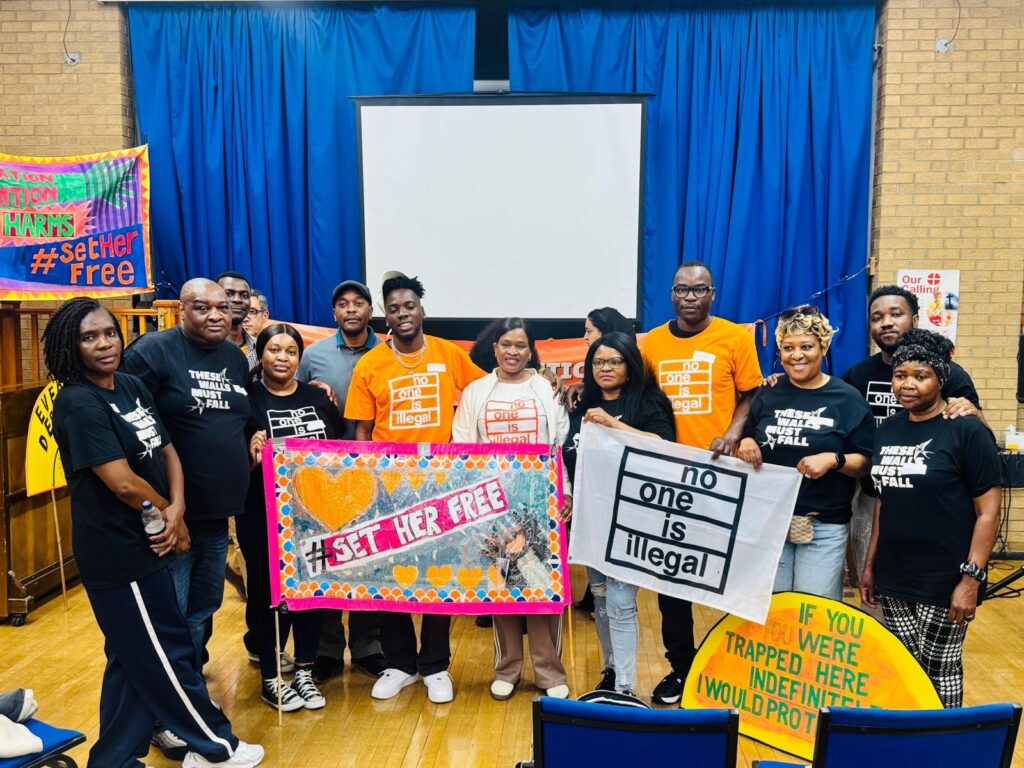
A warning: this is a long piece, introducing you to the thinking, rationale and care behind many of the Right to Remain events. Each of our engagement events is carefully designed to boost the migration justice movement in a holistic way in line with our Theory of Change: building knowledge, radical solidarity and power. We see people who take part in these events join the dots of their knowledge and experiences with others’ – particularly those with lived experience of the asylum and immigration system – and start forming an allyship with confidence.
So what did we do in Newcastle on a sunny Saturday on 31 May 2025?
After months of planning, the Right to Remain crew and a large group of These Walls Must Fall lived-experience campaigners from Manchester and Liverpool gathered in Newcastle to deliver our event, ‘Thinking with our communities: detention and beyond’ in collaboration with the local No To Hassockfield Campaign.
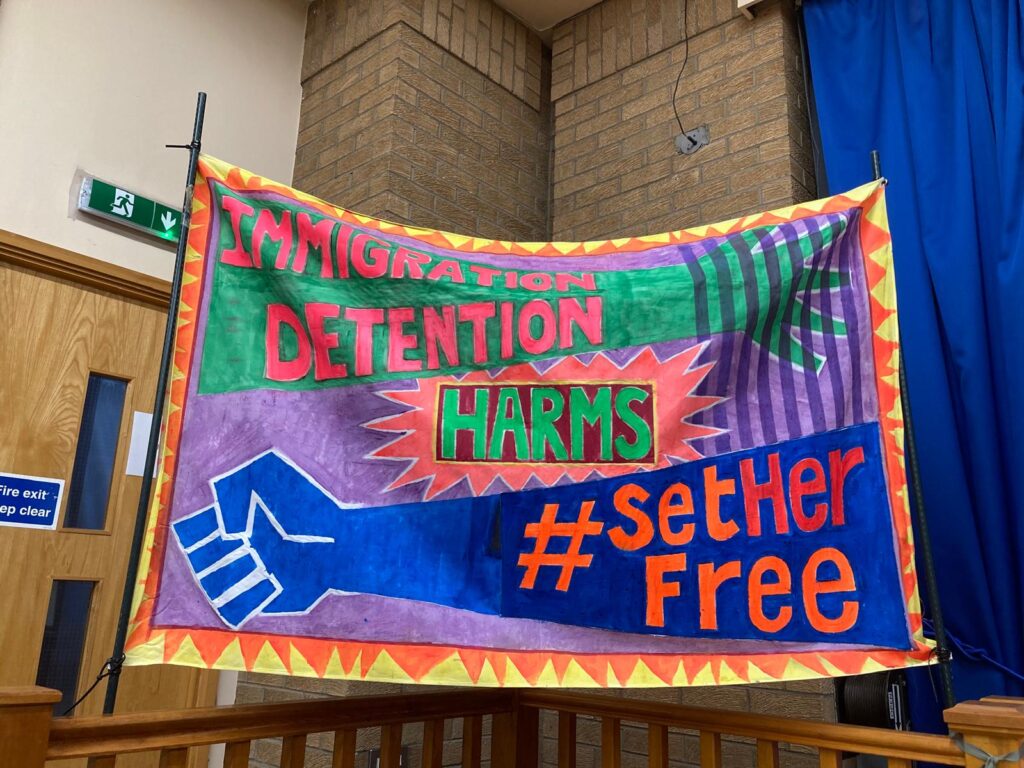
Writing recently on the rapid shift towards the far right observed across the world and the threats they pose to everything that we hold dear – dignity, rights and freedom, our friend Tasha Adams calls upon civil society actors to take a bold and radical approach to protect our communities. Noting that traditional tools of campaigning are proving to be less effective in this evolving environment, they write, ‘We need to organise in communities, while building the connective tissue so local to UK wide movement actors can support each other and stand in solidarity.’
At Right to Remain, we have consciously been doing precisely that for years – building the connective tissue. When attacks on our refugee and migrant communities – and many other aspects of our lives – continue in ever increasing ways, it drains us. It robs us of hope and ability to focus, just as these attacks are designed to. That’s why we believe building confidence, capacity and connections amongst local groups and people and bringing them into the wider migration justice movement is so important – especially outside the London bubble. Our community needs to be able to feel solidarity in their locality and feel connected with other circles of solidarity in different parts of the UK so that they know they are not alone. We believe that cultivating and practicing hope is a prerequisite for any effective movement.
Since last April’s Rwanda panic, communities across the UK stood up against the Tory government’s plan to round people up for their first Rwanda flight. At Right to Remain, we have been putting our energy to build on that movement moment by sharing the connective tissue that These Walls Must Fall created in Manchester and Liverpool. We have also run a number of sessions on reporting and detention, including in Birmingham, Nottingham and Sheffield.
While we know it is necessary, it’s never a happy occasion to discuss detention. And this event was a particularly poignant one for Right to Remain. At the time, we were amidst our Free Fatou campaign, with Fatou still detained in Yarls Wood detention centre. We were all consumed by our own raw emotions of fear and sadness: it felt like the entire world was against us, while we also wanted to be strong to support our movement. Partnering with the No To Hassockfield Campaign for this event had a deeper significance for us as the group played a key role in delaying Fatou’s transfer from Derwentside detention centre to Yarls Wood via their peaceful and effective direct action. They have been our steadfast ally, which gave us hope.

We were determined to bring our experience of the Free Fatou campaign to the fore at the Newcastle event and to stress how precious it is to be united in allyship and to be supported by the connective tissue of solidarity. We also wanted to honor Fatou’s call for action. From her detention cell, she continued to draw attention to the injustice and harm other women she met in detention were going through.
A total of 45 people spent their Saturday with us to share our lived experience of the Hostile Environment and immigration enforcement. We are grateful to everyone who came.
In 2024/25, Right to Remain ran 54 events. For a tiny staff team, this is a staggeringly high number. We are battle-hardened by them and have developed stamina to cope. Still, holding a safe yet charged space for people who are unfamiliar with each other to talk and think through painful subjects, such as immigration detention, is a dauntingly delicate task.
The efforts and costs to run these events often go unnoticed and unacknowledged. We continue running these events because we see their impact in communities we touch – new energy, solidarity and power. Behind the scenes, we spend weeks managing the logistics, planning and coordination of the events. We fret over the expenses of the venue hire, travel and refreshments – particularly the refreshments. Ordering food without knowing how many people are actually going to show up always feels disproportionately stressful for a financially squeezed organisation.
For this Newcastle event, we were blessed with many people and groups’ generosity. Special shout out goes to Hannah at Asylum Matters and Jen and Refugee Advisory Group at Refugee Futures in Stockton. The No To Hassockfield Campaign was the superhero of the day: their beautiful demo placards and banners adorned the auditorium, they managed the registration desk and security. They also nourished us with tea, coffee and lunch and provided French interpretation too. Each event is a reminder that we are lucky to have the backing of people who make donations to Right to Remain and the funders who support our work so that we can continue to sustain the migration justice movement that is under attack.

We started off the event by checking the temperature of the room. We invited people to close their eyes and asked the following questions. Only Eiri, our Director, and Maggy, our Organiser, were allowed to keep their eyes open!
- Q1 – If you are feeling excited about today, raise your hand.
- Q2 – If you are feeling nervous about today, raise your hand.
- Q3 – If you feel that you don’t know that much about asylum or migration, raise your hand.
- Q4 – If this is the first time you are going to hear about immigration detention, raise your hand.
We were pleasantly surprised to find the participants included a fair number of people who said they didn’t know much about asylum or migration. For many, this was also the first time that they were going to hear about immigration detention. We were on a good start to accomplish the mission of mainstreaming migration justice conversations beyond the usual suspects.
We paired up people who do not know each other and asked them to share their wins and celebrations. This is always a great, lively, icebreaker – a reminder for them and for ourselves that we have power inside us to change the world for better: No win is too small.
In the next section, we shared our Free Fatou campaign and introduced the topic of detention to the audience. While there are wins, in reality, we also have pains every minute of every day – and that is reporting, detention and removals. We invited Manono, our These Walls Must Fall campaigner in Liverpool, to share our experience of Fatou’s detention. As Manono calmly explained how she found out that Fatou was detained and how we stood by her – Manono is a good friend of Fatou – you could hear a pin drop in the auditorium. Manono herself has been detained twice. Many of our These Walls Must Fall campaigners, including Manono, report regularly. Fatou’s experience has been a huge shock to all of us.We were all thinking, ‘It could have been me. It could have been any of us.’ But the connective tissues of solidarity that we built in Liverpool, Manchester, Durham and across the UK sprung into action to protect Fatou.
We then asked another These Walls Must Fall campaigner, Tjarirove Tjivava, to interview Helen Groom from the No To Hassockfield campaign to tell us about what a detention centre is like inside and how some people are supporting people who report at the Middlesbrough reporting centre – another example of emerging connective tissue.
Maggy moderated the next panel inviting our These Walls Must Fall campaigners Joseph and Teresa to explain to the audience what it feels like to be detained and to go through the reporting process, always fearing you could be detained. We also heard from Haja from Refugee Futures in Stockton to share her experience of community solidarity that sustained her.
Something always goes horribly wrong with our events. Last time in Sheffield, we were kicked out of the room much earlier than expected and we didn’t have a chance to do our action planning properly. This time in Newcastle, the projector didn’t work sowe decided to skip much of the public legal education element of reporting and detention. Frustrating as it was, the interventions of people with lived experience of the Hostile Environment were so compelling that we ultimately did not miss that section! (However, if you want to know more about how to use our Toolkit, you can request an online workshop from us. Read more about the offer here.)
After a delicious Kurdish lunch and excellent flapjack donated by the No To Hassockfield Campaign, we were led by the facilitators Amy Golding and Korey who used props and prompts to help process our emotions and feelings about what we had heard from the lived experience leaders in the morning. We finished the day with the No To Hassockfield Campaign leading action planning for the Refugee Week, changing the narrative and the very important 18 October National Day Of Solidarity To End Immigration Detention.
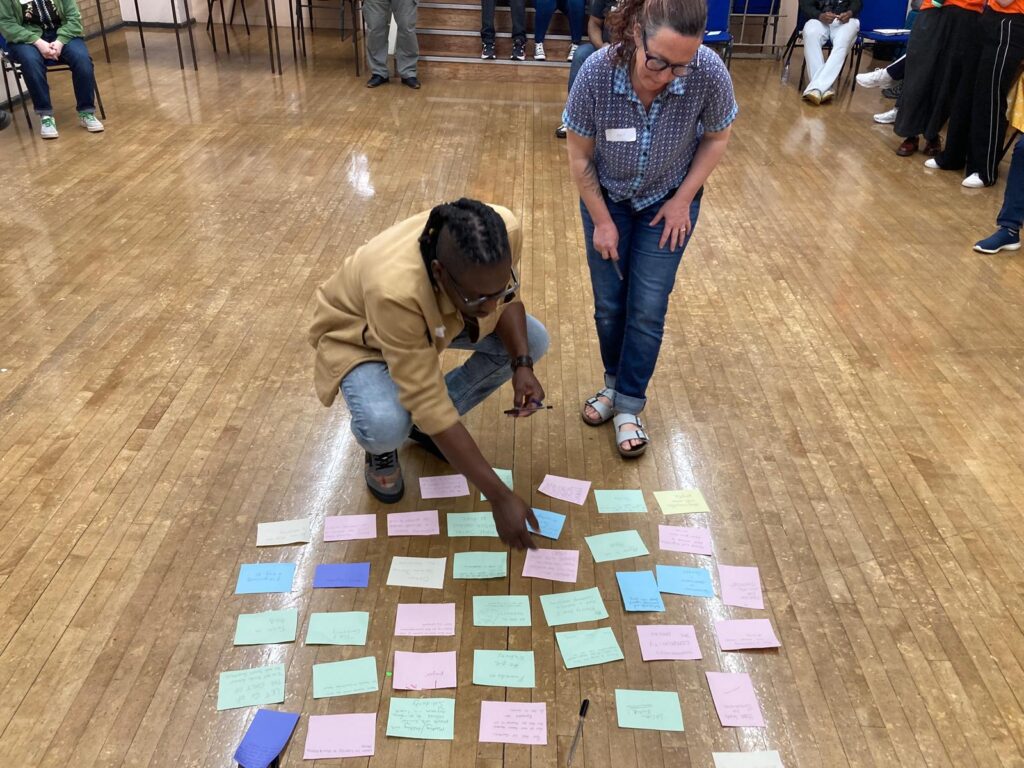
It’s hard work delivering these sessions to build solidarity, but our efforts to hold safe space do pay off. Solidarity needs genuine connections, and that inevitably involves some forms of acknowledging our shared vulnerabilities. These Walls Must Fall campaigners demonstrate their trust in our space as they share their lived experience of the hostile environment. This in turn nudges others to open up and reach out to others.
“That was the scariest moment in my life as a person of colour.” One person approached us during the break, sharing openly their experience of the summer or race riots last year. They asked us to consider being part of their podcast series.
“I never expected this from my own country.” Another person who was caught in the minimum income threshold rule for bringing foreign national spouses confided in us. “But what I heard today about detention really shocked me. This government is treating some people in an appalling manner.”
“I never knew anything about immigration detention and reporting. What I heard today completely gobsmacked me. Our group really wants to be involved in supporting people in this situation.” Another person who is part of a social justice group asked me to introduce them to other local groups so that they can start working together.
The space we create generates these moments of profound connections. They help people to recognise that they are not alone and they can work together to challenge the status quo. Our events create connective tissues in local areas, which enable our communities to support and stand in radical solidarity with each other at a bigger scale and, just as when Fatou was detained, at a time of crisis.
My personal final reflection on this Newcastle event is how far we have come as Right to Remain since we started co-delivering these sessions with the These Walls Must Fall campaigners. The campaigners were articulate, powerful, graceful and thoughtful in everything they did during the event, energising everyone who was in the room. That’s why when Maggy put me on the spot on the day in front of the audience asking me ‘So Eiri, what gives you hope?’, all I could say was ‘You guys give me hope.’ That’s the truth. And I wish you were there to feel that power.
Our next stop is 17 July, the online launch of our National Day of Solidarity to End Immigration Detention which is taking place in October. I hope you can all join us so that we can continue to build more connective issues for radical solidarity – for a world where no one is illegal.
You can also help us build more connective tissues by supporting our work here.
Eiri Ohtani, Director
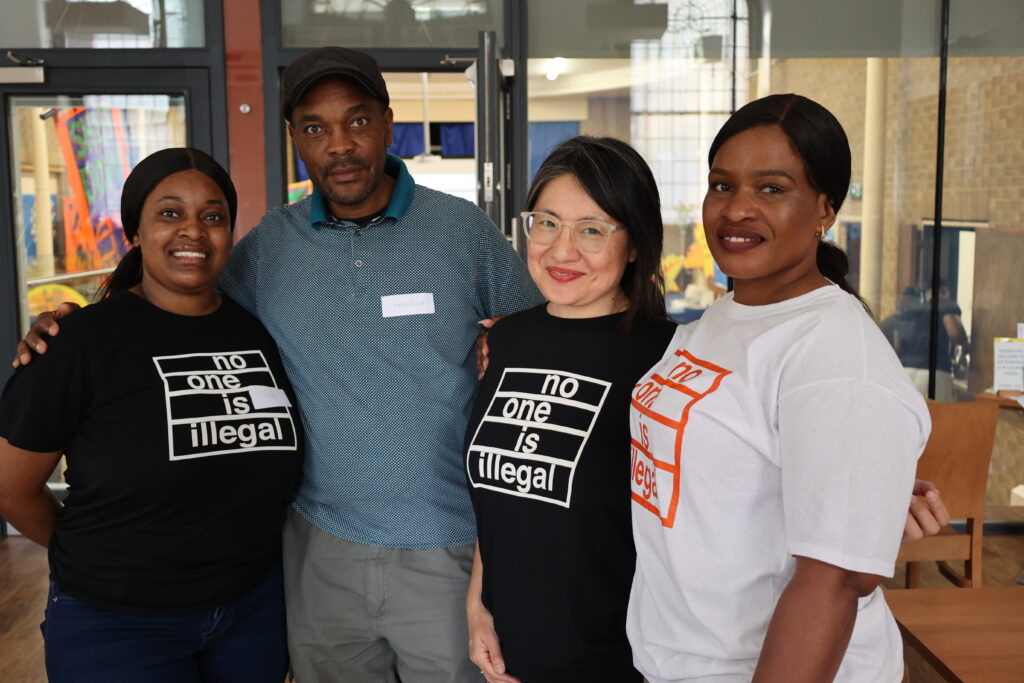

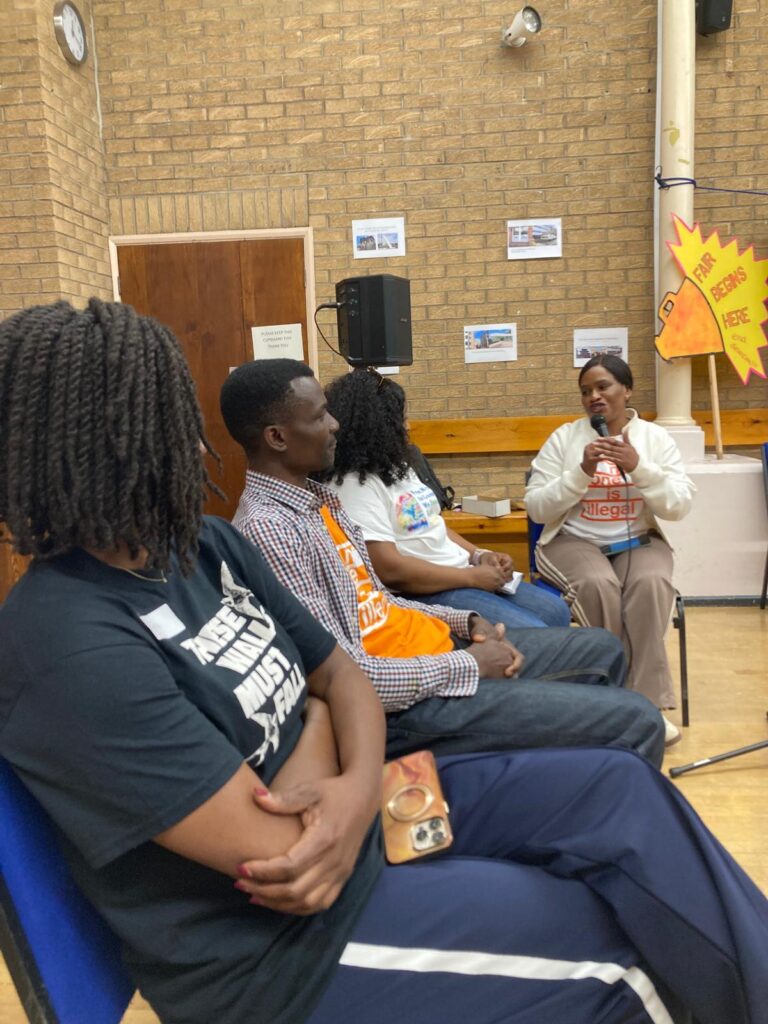
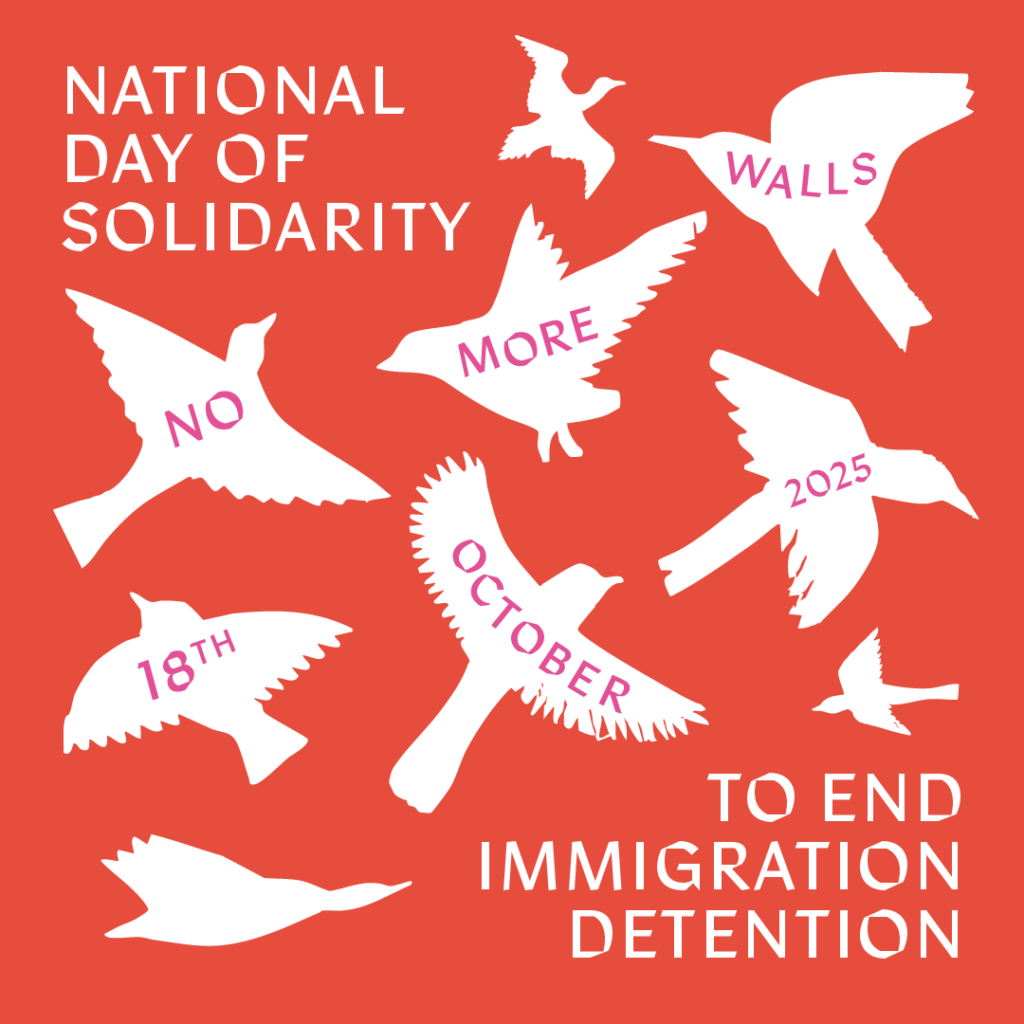












Discussion: